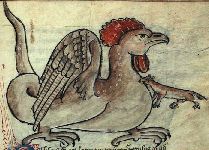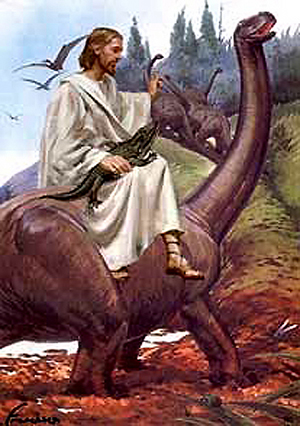Monsters in the Bible
Latest revision as of 01:39, 1 February 2010
The Bible is full of all kinds of interesting lore. Most notably are the various descriptions of monsters and mythical creatures...
Contents |
Cockatrice
(Etymology: First attested 1382, from Old French cocatris, from Late Latin calcātrīx ("she who treads upon something"), from Latin calcō ("tread"), from calx ("heel, hoof").)
A cockatrice is a serpent, hatched from a cock's egg, that can kill with a glance. They are rare nowadays.
- Jermiah 8:17:
|
|---|
- isaiah 11:8:
|
|---|
- isaiah 59:5:
|
|---|
- isaiah 14:29:
|
|---|
Dinosaurs
(Etymology: From Ancient Greek δεινός (deinos), "terrible, awesome, mighty") + σαῦρος (sauros), "lizard").)
The bible calls them "Behemoths", but it sure sounds like a Dinosaur. This is the passage creationists use to claim that man and Dinosaurs co-existed, for more details see Was Behemoth a Dinosaur?:
- Job 40:15-24
|
|---|
Dragons
(Etymology: From Old French dragon, from Latin dracō, from Ancient Greek δράκων (drakōn), "a serpent of huge size, a python, a dragon"), probably from δρακεῖν (drakein), aorist active infinitive of δέρκομαι (derkomai), "I see clearly").)
These verses falsely predict that Babylon will never again be inhabited and that Dragons will live in Babylonian palaces and satyrs will dance there.
- Isaiah 13:21-22:
|
|---|
Satyr
(Etymology: Ancient Greek Σάτυροι, Satyroi)
A satyr is a Greek mythological creature, that is half man on the top and half goat on the botom with ears and horns from the goat. It is a very lustful creature, and is often portrayed carrying a flute of some sort.
Satyrs make an appearance two times in the bible:
- Isiah 13:21:
But wild beasts of the desert shall lie there; and their houses shall be full of doleful creatures; and owls shall dwell there, and satyrs shall dance there.
|
|---|
- Isiah 34:14:
The wild beasts of the desert shall also meet with the wild beasts of the island, and the satyr shall cry to his fellow; the screech owl also shall rest there, and find for herself a place of rest.
|
|---|
Sea Monsters
The Leviathan is a huge sea monster (Psalm 74:13-14; Job 41; Isaiah 27:1).
(Etymology: From Hebrew (Biblical and Modern) לִוְיָתָן ("whale").)
The word "Leviathan" appears five places in the Bible:
- Book of Job 3:8 "May those who curse days curse that day, those who are ready to rouse Leviathan "; NIV
- Book of Job 41:1-34: "Canst thou draw out leviathan with an hook? or his tongue with a cord which thou lettest down?...He beholdeth all high things: he is a king over all the children of pride." KJV (quoted 1 and 34 only)
- Psalms 74:14: "Thou brakest the heads of leviathan in pieces, and gavest him to be meat to the people inhabiting the wilderness." KJV
- Psalms 104:24,25: "O LORD, how manifold are thy works! in wisdom hast thou made them all: the earth is full of thy riches. So is this great and wide sea, wherein are things creeping innumerable, both small and great beasts." KJV;
- Isaiah 27:1: "In that day the Lord with his sore and great and strong sword shall punish leviathan the piercing serpent, even leviathan that crooked serpent; and he shall slay the dragon that is in the sea." KJV
This creature is also mentioned twice in the Talmud: Avoda Zara (3b), Moed Katan (25b)
Job 41 goes into detail on the monster:
- Job 41:
Canst thou draw out leviathan with an hook? or his tongue with a cord which thou lettest down?
Canst thou put an hook into his nose? or bore his jaw through with a thorn?
Will he make many supplications unto thee? will he speak soft words unto thee?
...Behold, the hope of him is in vain: shall not one be cast down even at the sight of him?
None is so fierce that dare stir him up: who then is able to stand before me?
...His scales are his pride, shut up together as with a close seal.
One is so near to another, that no air can come between them.
They are joined one to another, they stick together, that they cannot be sundered.
By his neesings a light doth shine, and his eyes are like the eyelids of the morning.
Out of his mouth go burning lamps, and sparks of fire leap out.
Out of his nostrils goeth smoke, as out of a seething pot or caldron.
His breath kindleth coals, and a flame goeth out of his mouth.
In his neck remaineth strength, and sorrow is turned into joy before him.
The flakes of his flesh are joined together: they are firm in themselves; they cannot be moved.
His heart is as firm as a stone; yea, as hard as a piece of the nether millstone.
When he raiseth up himself, the mighty are afraid: by reason of breakings they purify themselves.
The sword of him that layeth at him cannot hold: the spear, the dart, nor the habergeon.
He esteemeth iron as straw, and brass as rotten wood.
The arrow cannot make him flee: slingstones are turned with him into stubble.
Darts are counted as stubble: he laugheth at the shaking of a spear.
Sharp stones are under him: he spreadeth sharp pointed things upon the mire.
He maketh the deep to boil like a pot: he maketh the sea like a pot of ointment.
He maketh a path to shine after him; one would think the deep to be hoary.
Upon earth there is not his like, who is made without fear.
He beholdeth all high things: he is a king over all the children of pride.
|
|---|
Unicorns
(Etymology: Latin ūnicornis, from unus : one + cornu - u : horn.)
Unicorns are mentioned no less than nine times in the Bible (Numbers 23:22, Numbers 24:8, Deuteronomy 33:17, Job 39:9-10, Psalms 22:21, Psalms 29:6, Psalms 92:10, Isaiah 34:7). Most notably the King James Version. More modern translations have replaced the unicorn with "wild ox". Others speculate ancient unicorns may have been rhinoceros.
- Numbers 23:22:
God brought them out of Egypt; he hath as it were the strength of an unicorn. KJV
|
|---|
Beast With Seven Heads
Take all the horror scripts from hollywood, put them in a blender and you have the Book of Revelation. It contains some pretty radical monsters such as this 10-horned, 7-headed beast:
- Revelation 17:3:
So he carried me away in the spirit into the wilderness: and I saw a woman sit upon a scarlet coloured beast, full of names of blasphemy, having seven heads and ten horns.
|
|---|
The beast apparently also has quite the fetish for headgear:
- Revelation 13:1:
And I stood upon the sand of the sea, and saw a beast rise up out of the sea, having seven heads and ten horns, and upon his horns ten crowns, and upon his heads the name of blasphemy.
|
|---|
Zombies
What could be more fun than Zombies for Jesus!
- Matthew 27:52-53:
|
|---|
Flying/fiery serpents
- isaiah 14:29:
|
|---|
- isaiah 30:6:
|
|---|
- numbers 21:6:
|
|---|
Extra-Terrestrials
- 1 Peter 2:11:
|
|---|
- psalm 94:6:
|
|---|
NOTE: Some believe "alien" may be a synonym for "immigrant". Additional research on the original language sources may be necessary to gather more details.
See also
This site costs a lot of money in bandwidth and resources. We are glad to bring it to you free, but would you consider helping support our site by making a donation? Any amount would go a long way towards helping us continue to provide this useful service to the community.
Click on the Paypal button below to donate. Your support is most appreciated! |
|---|





